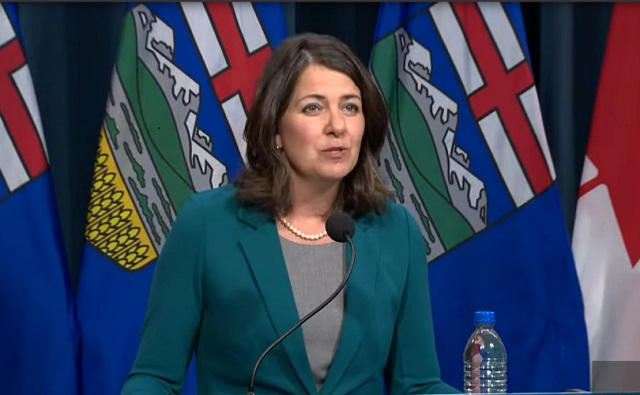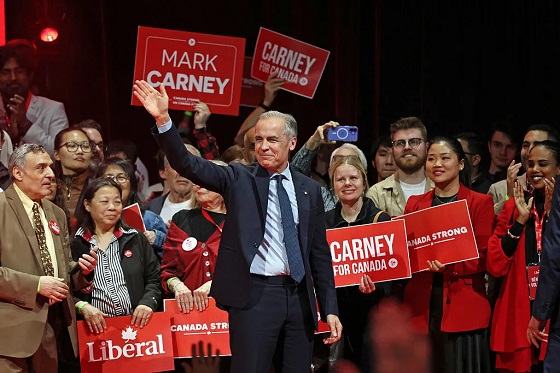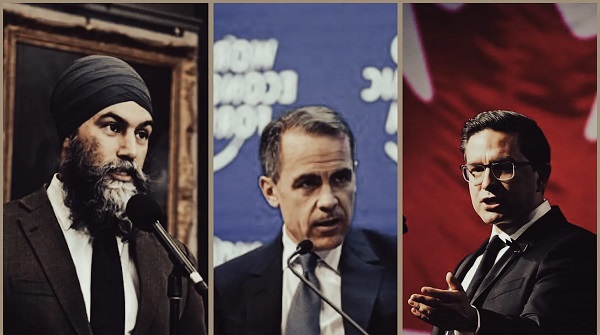Alberta
Alberta Conservatives pass slew of anti-woke, pro-medical freedom policies at annual meeting

From LifeSiteNews
UCP members voted to ‘protect an individual’s right to informed consent decisions regarding their own body.’
Over 3,800 grassroots members of Alberta’s ruling United Conservative Party (UCP) voted to pass a slew of pro-family, medical freedom, and anti-woke policies at its annual general meeting over the weekend, including one calling for a bill to support “comprehensive parental rights” in education.
In total, UCP members debated some 51 resolutions, with 30 of them pertaining to official party policy, on November 3 and 4 at the AGM, which took place in Calgary. The resolutions are non-binding.
Most important, UCP members voted to “protect an individual’s right to informed consent decisions regarding their own body.”
“No government, business, corporation, entity, non-profit, or any other organization, institution or society has the right to mandate, force, or coerce an individual into a medical intervention or procedure, regardless of the societal benefit or otherwise,” resolution four reads.
This resolution pertains to how COVID jabs were pushed on the population without proper consent taking place in many instances, such as when workplace jab mandates were enacted.
The many pro-medical freedom resolutions came about after former leader of the party and Alberta Premier Jason Kenney backtracked and enacted COVID vaccine passports in the province for a time, as well as allow health officials to enact jabs mandates for staff. This resulted in him eventually being turfed as party leader, with Danielle Smith taking his place.
Other votes in favor of medical freedom included UCP party members voting to “Protect an individual’s right to free expression” and as well as “Protect a medical practitioner’s right to research, speak, and write; and protect Medical Doctors and all healthcare professionals from having their licenses to practice threatened for publicly expressing professional medical opinions in any public setting.”
Resolution 16, which calls for the party to “enshrine the doctor-patient relationship” by “protecting Alberta physicians from undue third-party interference,” was also passed by members.
Smith, who now leads the UCP and is Alberta’s Premier, told reporters that her government is not bound to follow the UCP’s decision should the motion be passed but noted she does support the party’s grassroots process.
Party members vote to mandate parental consent for parents concerning pro-noun use
In a speech to delegates to start the AGM, Smith made it clear she stands with parental rights, saying to delegates, “I want every parent listening today to hear me loud and clear: parents are the primary caregivers and educators of their children.”
Later in the day, UCP members voted in favor of a resolution mandating parental consent for children to “change” their pronouns at school.
Resolution 8, which passed, read that the UCP should “require teachers, schools, and school boards to obtain the written consent of the parent/guardian of a student under the age of 16 prior to changing the name and/or pronouns used by the student.”
The rationale behind the passing of this resolution reads, “Conservative governments of Saskatchewan and New Brunswick recently implemented the requirements for parental consent for schools to use an alternate name or pronoun for a student.”
“Parents, not schools, are the legal guardians of their children. As was noted by Saskatchewan Education Minister Dustin Duncan, schools require a signed permission slip to take children on a field trip so it’s unclear why schools should not require parental consent for identification changes. Schools should not be in the business of going behind parents’ backs.”
UCP members also passed resolution 17, which calls for the party to support a comprehensive Bill of “Parental Rights which ensures that all legislation will recognize and support parents’ rights to be informed of and in charge of all decisions to do with all services paid for by the province, including education and health care.”
Party members also passed resolution 20, which calls for the party to ban pornographic materials from being allowed to be used by teachers.
“The United Conservative Party believes that the Government of Alberta should … h) Ensure that teachers, schools, school boards, and third parties providing services to kindergarten to Grade 12 schools do not provide access to materials of a sexual, racist, or abusive nature, including, but not limited to: books, handouts, online materials, and live events that are not part of the Alberta Program of Studies,” the resolution reads.
In September, Smith refused to expel a caucus member who attended the Million Person March against LGBT indoctrination, adding that she is “sympathetic to parents” who do not want their kids taught explicit sexual content in school.
UCP members call for party to ‘oppose’ expansion of euthanasia
At its AGM, UCP members also passed a resolution calling for the party to stop the expansion of legal euthanasia.
Members voted for the party to “Oppose the federal expansion of Medical Assistance in Dying (MAiD) qualifying criteria to include those suffering solely from mental illness and oppose the future legalization of MAiD as a care option for minor children.”
The resolution also calls for the party to “establish protocols for provincial implementation of the federally legalized MAiD program,” wherein healthcare workers in “any facility” shall not be allowed to “present or promote MAiD to a patient as a care option.”
“The procedure must be considered a tragic last resort and only be discussed with a patient of legal age upon request by said patient or their proxy,” the resolution reads.
“Individual healthcare workers and private hospice facilities must have their rights to freedom of conscience honored when deciding to participate in administering MAiD.”
On March 9, 2024, euthanasia in Canada, or MAiD as it is known, will expand to include those suffering solely from mental illness. Pro-life advocates and Conservative MPs have called for this expansion to be stopped.
When it came to issues of free speech, UCP members voted to “ban post-secondary institutions from using race as a factor in any admissions program or procedure,” along with voting to “protect an individual’s right to free expression.”
Also passed was a resolution calling to ensure the post-secondary institutions be “places of free thought and learning of employable skills by eliminating all Diversity, Equity, and Inclusion (DEI) offices at all public universities, colleges, technical institutes, and trades schools and all adult education institutions.”
“They are not places for indoctrination of identity politics, reverse racism, or radicalization. Any postsecondary institution that maintains a DEI office, policy, or equivalent shall lose government financial support,” the resolution reads.
Additionally, the party also passed resolutions calling for it to support the use of “cash” as a payment method to be protected and to “oppose” the promotion of “digital currency.”
UCP members also voted to protect Alberta’s autonomy from federal government overreach by passing resolution 1, which calls for the party to “defend Alberta’s economy and autonomy by opposing all attempts by the Federal government to impose net zero by 2035.”
Alberta has repeatedly promised to place the interests of their people above Prime Minister Justin Trudeau government’s “unconstitutional” demands while consistently reminding the federal government that their infrastructures and economies depend upon oil, gas, and coal.
Alberta
It’s On! Alberta Challenging Liberals Unconstitutional and Destructive Net-Zero Legislation

“If Ottawa had it’s way Albertans would be left to freeze in the dark”
The ineffective federal net-zero electricity regulations will not reduce emissions or benefit Albertans but will increase costs and lead to supply shortages.
The risk of power outages during a hot summer or the depths of harsh winter cold snaps, are not unrealistic outcomes if these regulations are implemented. According to the Alberta Electric System Operator’s analysis, the regulations in question would make Alberta’s electricity system more than 100 times less reliable than the province’s supply adequacy standard. Albertans expect their electricity to remain affordable and reliable, but implementation of these regulations could increase costs by a staggering 35 per cent.
Canada’s constitution is clear. Provinces have exclusive jurisdiction over the development, conservation and management of sites and facilities in the province for the generation and production of electrical energy. That is why Alberta’s government is referring the constitutionality of the federal government’s recent net-zero electricity regulations to the Court of Appeal of Alberta.
“The federal government refused to work collaboratively or listen to Canadians while developing these regulations. The results are ineffective, unachievable and irresponsible, and place Albertans’ livelihoods – and more importantly, lives – at significant risk. Our government will not accept unconstitutional net-zero regulations that leave Albertans vulnerable to blackouts in the middle of summer and winter when they need electricity the most.”
“The introduction of the Clean Electricity Regulations in Alberta by the federal government is another example of dangerous federal overreach. These regulations will create unpredictable power outages in the months when Albertans need reliable energy the most. They will also cause power prices to soar in Alberta, which will hit our vulnerable the hardest.”
Finalized in December 2024, the federal electricity regulations impose strict carbon limits on fossil fuel power, in an attempt to force a net-zero grid, an unachievable target given current technology and infrastructure. The reliance on unproven technologies makes it almost impossible to operate natural gas plants without costly upgrades, threatening investment, grid reliability, and Alberta’s energy security.
“Ottawa’s electricity regulations will leave Albertans in the dark. They aren’t about reducing emissions – they are unconstitutional, ideological activist policies based on standards that can’t be met and technology that doesn’t exist. It will drive away investment and punish businesses, provinces and families for using natural gas for reliable, dispatchable power. We will not put families at risk from safety and affordability impacts – rationing power during the coldest days of the year – and we will continue to stand up for Albertans.”
“Albertans depend on electricity to provide for their families, power their businesses and pursue their dreams. The federal government’s Clean Electricity Regulations threaten both the affordability and reliability of our power grid, and we will not stand by as these regulations put the well-being of Albertans at risk.”
Related information
- Conference Board of Canada socio-economic Impacts of Canada’s 2030 Emissions Reduction Plan – (April 2025)
- Alberta Electric System Operator’s position on Canadian Energy Regulations
Alberta
Alberta’s future in Canada depends on Carney’s greatest fear: Trump or Climate Change

Oh, Canada
We find it endlessly fascinating that most Canadians believe they live in a representative democracy, where aspiring candidates engage in authentic politicking to earn their place in office. So accustomed are Canada’s power brokers to getting their way, they rarely bother to cover their tracks. A careful reading of the notoriously pliant Canadian press makes anticipating future events in the country surprisingly straightforward.
Back in December, when Pierre Poilievre was given better than 90% odds of replacing Prime Minister Justin Trudeau—and Mark Carney was still just an uncharismatic banker few had heard of—we engaged in some not-so-speculative dot-connecting and correctly predicted Carney’s rise to the top spot. Our interest was driven by the notoriously rocky relationship between Ottawa and the Province of Alberta, home to one of the world’s largest hydrocarbon reserves, and how Carney’s rise might be a catalyst for resetting Canada’s energy trajectory. In a follow-up article titled “The Fix Is In,” we laid out a few more predictions:
“Here’s how the play is likely to unfold in the weeks and months ahead: Carney will be elected Prime Minister on April 28 by a comfortable margin; [Alberta Premier Danielle] Smith will trigger a constitutional crisis, providing cover for Carney to strike a grand bargain that finally resolves longstanding tensions between the provinces and Ottawa; and large infrastructure permitting reform will fall into place. Protests against these developments will be surprisingly muted, and those who do take to the streets will be largely ignored by the media. The entire effort will be wrapped in a thicket of patriotism, with Trump portrayed as a threat even greater than climate change itself. References to carbon emissions will slowly fade…
In parallel, we expect Trump and Carney to swiftly strike a favorable deal on tariffs, padding the latter’s bona fides just as his political capital will be most needed.”
The votes have barely been counted, yet the next moves are already unfolding…
“Alberta Premier Danielle Smith says she’ll make it easier for citizens to initiate a referendum on the province’s future in Canada, after warning that a Liberal win in Monday’s election could spur a groundswell of support for Alberta separatism. Smith said on Tuesday that a newly tabled elections bill will give everyday Albertans a bigger say in the province’s affairs.
‘(We’re giving) Albertans more ways to be directly involved in democracy, and to have their say on issues that matter to them,’ Smith told reporters in Edmonton.
If passed, the new law would dramatically lower the number of signatures needed to put a citizen-proposed constitutional referendum question on the ballot, setting a new threshold of 10 per cent of general election turnout — or just over 175,000, based on Alberta’s last provincial election in 2023.”
“US President Donald Trump said on Wednesday that Canadian Prime Minister Mark Carney is looking to make a trade deal and will visit the White House within the next week. Trump said he congratulated Carney on his election victory when the Canadian leader called on Tuesday.
‘He called me up yesterday – he said let’s make a deal,’ Trump told reporters at the White House after a televised Cabinet meeting.”
Remember where you read it first.
-

 2025 Federal Election2 days ago
2025 Federal Election2 days agoNDP Floor Crossers May Give Carney A Majority
-

 Alberta18 hours ago
Alberta18 hours agoIt’s On! Alberta Challenging Liberals Unconstitutional and Destructive Net-Zero Legislation
-

 Business2 days ago
Business2 days agoChina’s economy takes a hit as factories experience sharp decline in orders following Trump tariffs
-

 Automotive2 days ago
Automotive2 days agoNew federal government should pull the plug on Canada’s EV revolution
-

 Business1 day ago
Business1 day agoTrump’s bizarre 51st state comments and implied support for Carney were simply a ploy to blow up trilateral trade pact
-

 Mental Health2 days ago
Mental Health2 days agoHeadline that reads ‘Ontario must pay for surgery to give trans resident both penis and vagina: appeal court’ a sign of the times in Canada
-

 Business2 days ago
Business2 days agoScott Bessent says U.S., Ukraine “ready to sign” rare earths deal
-

 Alberta2 days ago
Alberta2 days agoPreston Manning: Canada is in a unity crisis




